If Tom Hanks is my generation’s Jimmy Stewart, then Denzel Washington is its Sidney Poitier. Washington’s career in some ways parallels Poitier’s, though even at his most noble, he had the luxury of adding more bite than Poitier could in his heyday. As a sexy Black leading man, Poitier was far too dangerous onscreen to truly be unleashed by the studio system; he had to cut the restraints himself in a slew of 70’s films he produced and directed. Washington smoldered and cut loose far earlier in his career. He had a different time period, and directors unafraid of brown-skinned sensuality like Mira Nair and Spike Lee, to help him out.
Both Denzel and Sidney were credible in the roles they undertook, and both were occasionally guilty of coasting by on their trademark mannerisms and speech patterns. Both could go on a first name basis in the Black community, as if they were family members or hangout buddies. And at their moments of lead actor Oscar glory, both were awarded for lesser performances than the ones for which they should have won.
Hollywood made the Poitier-Washington correlation explicit the night the Academy honored them both with their second Oscars. It’s a shame that the two never worked together, though it is certainly not too late. Perhaps a buddy cop movie, or that remake of Uptown Saturday Night that keeps getting floated around?
Washington is one of our finest actors, and he’ll next be seen in 2 Guns alongside Mark Wahlberg and a bunch of explosions. In honor of his teaming up with the artist formerly known as Marky Mark, I present 10 Denzel Washington performances.
10.) Inside Man
Spike Lee’s fourth collaboration with Washington is a throwback to gritty 1970’s New York City crime dramas like Dog Day Afternoon and The Taking of Pelham 1-2-3. Denzel plays a weary NYC detective called in to diffuse a hostage situation. The plot machinations don’t hold up under scrutiny, but Lee uses a parade of memorably ethnic Noo Yawk City caricatures to provoke thoughts on race, gender and class. The close proximity of Washington’s Mt. Vernon roots give him a convincing NYC swagger, and his scenes with partner Chiwetel Ejiofor allow for some amusing line readings. Most memorably, Lee gives Washington something to come home to that makes his job (and the final plot revelation) worthwhile. The brilliant, sexy last shot of Inside Man earns both Denzel’s and the audience’s satisfied response.
9.) Unstoppable
Spike made four movies with Denzel, but Tony Scott trumped Lee by making five. I chose this one because it’s the only Scott-Washington collaboration I enjoyed. For me, Washington is least effective when he’s in full blown “Quien es más macho” mode. He’s never willing to get truly, persona-threateningly dirty like Wesley Snipes or Don Cheadle. Films like Crimson Tide, which is 2 hours of Denzel and Gene Hackman yelling and measuring each other’s dicks, allow Washington to coast far too long on those “Denzel-isms” Jay Pharoah so cleverly mocks on Saturday Night Live. In Unstoppable, Scott presents a heroic Denzel who’s tough, vulnerable and knowledgeable enough to help save the day. Between Washington and Chris Pine, there’s a softer presentation of the usual Tony Scott character antagonism. Scott’s directorial tics, which I’ve always found annoying, work in his favor here, crafting a suspenseful ride through situations as tight as the curves Unstoppable’s runaway train navigates.
8.) Power
Here’s an early Denzel performance most people forget. Before Lee and Scott jumped on the bandwagon, quintessential NYC director Sidney Lumet cast Washington in an unusual role for a Black actor, at least in 1986. Washington’s character, Arnold Billings, is a morally ambiguous, formidable opponent for lead actor Richard Gere. Billings is a lobbyist in bed with the oil companies, and he’s not below criminal activity for political gain. Denzel is charming as hell here, showing the first signs of a long future on the big screen. Power foreshadowed the darker turns Washington would later undertake, but is all but forgotten.
7.) Training Day
Speaking of darker turns, Washington won an Oscar for playing the most villainous role of his career. And he would have gotten away with it too, if it weren’t for that meddling screenwriter and his ape. Denzel’s performance loses all its nuanced ambiguity and quiet terror the moment he has his “King Kong ain’t got shit on me!” neighborhood freak-out. It wasn’t necessary. Washington’s Alonzo was far scarier when his actions carried a hint of the street-smart effectiveness that kept cops on his beat alive. When you begrudgingly had to acknowledge that Alonzo’s corrupt lessons got the job done, Training Day was an uneasy wallow in subdued madness. All that hard work gets filled with as many holes as Alonzo does after he goes apeshit.
6.) The Hurricane
I’m a sucker for boxing movies. Denzel plays real-life boxer Rubin “Hurricane” Carter, twice convicted of a triple homicide before being released from prison after 18 years. Carter’s trials inspired a song by Bob Dylan and this film, which Norman Jewison considers his best work. The film also inspired howls of protest from critics for fictionalizing several items from Carter’s life. Washington is a totally credible boxer, and this is one of his best performances, a nicely calibrated mixture of anger, resentment, passion and sadness. Denzel received his fourth Oscar nomination for this, losing to Kevin Spacey for American Beauty. Also up for an Oscar that year was Russell Crowe, who, like Washington, would later play a somewhat fictionalized version of a real-life character. Crowe’s film won Best Picture. Rather than cynically pointing out more films that got less criticism for fictionalizing real-life events, I’ll take the high road and quote Roger Ebert’s Hurricane review:
“Several people have told me dubiously that they heard the movie was ‘fictionalized’. Well, of course it was. Those who seek the truth about a man from the film of his life might as well seek it from his loving grandmother. Most biopics, like most grandmothers, see the good in a man and demonize his enemies. They pass silently over his imprudent romances. In dramatizing his victories, they simplify them. And they provide the best roles to the most interesting characters. If they didn’t, we wouldn’t pay to see them.”
5.) The Great Debaters
Washington’s second film as director casts him as Melvin Tolson, a professor at historically Black Wiley College in Texas. In 1935, Tolson formed a debate team that went on to challenge and defeat reigning debate champions USC (the movie changes this to Harvard—BAD MOVIE!!). Washington’s direction is a tad shaky, but he gets fine work from Kimberly Elise, Forrest Whitaker and his youthful cast. Denzel’s performance follows in the footsteps of Sidney Poitier, who played a teacher in the guiltiest pleasure I have, To Sir, With Love. I cop to being a sucker for inspirational teacher movies (the abysmal Dead Poets Society excepted), but there’s another reason I love this movie. As I wrote in Steven Boone’s and my piece on American Gangster,
“I identified with the concept of being held up as the Black example, something I’ve dealt with in my profession and in life. I tapped into that well of feeling while watching The Great Debaters…I loved this movie because it got to me deep in the darkest, hidden recesses of my nappy soul and yes, I was inspired.”
4.) Glory
Washington’s first Oscar win (on his second nomination) is the quintessential Denzel performance. Every trick, every tic, everything that makes him Denzel can be found here. Ed Zwick’s Civil War movie is further elevated by a fine cast including Matthew Broderick, Morgan Freeman and Andre Braugher. Glory gets a bit of a bad rap because, like far too many Black stories, it’s told from the White point of view. I’m a little more forgiving of this, however, as Kevin Jarre’s screenplay is based partly on letters by Robert Gould Shaw, the character Broderick plays. A powerful work, and a chance to see Freeman at the top of his game and Washington nipping at his heels.
3.) Devil in a Blue Dress
One of the biggest sins in moviedom is the lack of any more films based on Walter Mosley’s Easy Rawlins series. The one film that resulted, Carl Franklin’s Devil in a Blue Dress, is a detective movie worthy of John Huston, with the damn near perfect casting of Denzel and Don Cheadle. As someone who has read the entire series, I can’t stress how well these actors fit the roles. Franklin’s adaptation and lensing are fantastic. Washington is at his most seductive, his heavy-lidded eyes registering lust and fear, sometimes in the same glance. Easy puts the noir in film noir, and Mosley’s take on race in Los Angeles across several decades deserves to be projected on a screen as big and dramatic as Mosley’s prose. Somebody start a Kickstarter or something!
2.) The Mighty Quinn
The Mighty Quinn is Denzel’s first big screen cop role AND his first movie with a Bob Dylan song title. This little known gem is Denzel’s loosest performance; Xavier Quinn radiates an infectious joy, shining light into the darkest corners of this island-set film noir-slash-musical-slash-bromance-slash-murder-mystery. In 98 minutes, The Mighty Quinn tackles serious issues like colonialism, race and class, presenting Washington with several opportunities to show his range. His last scene with Mimi Rogers is one of the most suspenseful and sexy seductions ever filmed. And when Quinn realizes his place in the island class hierarchy, Denzel expresses it by singing a Taj Mahal song. Director Carl Schenkel lovingly keeps his camera on Washington as he sings, and despite that Oscar for Glory, this is the film where Denzel became a star for me. It’s my favorite performance of his, and one of the best films of the 1980s.
1.) Malcolm X
Spike Lee’s magnum opus gives Denzel the epic treatment a star of his caliber deserves. Washington is electrifying in the lead role, presenting an uncanny representation of the slain civil rights leader. A complex man deserves a complex interpretation, and Lee and Washington succeed on every level. This is the type of performance that wins Oscars, but Hollywood’s notion of the type of roles for which minorities should win clouded its judgment. Regardless, the story of Malcolm X is forever preserved, both in this film and his autobiography. Not even Lee’s trademark people-mover sequences can distract the audience from Washington’s performance. I wish Denzel could trade in his Training Day Oscar for this role; this is his best performance.

















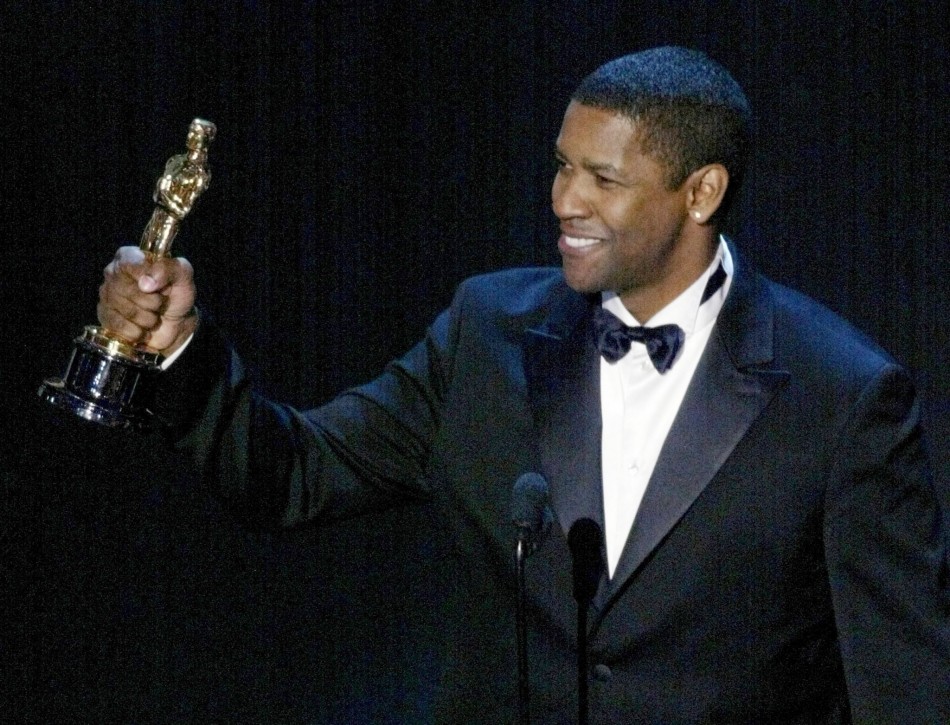
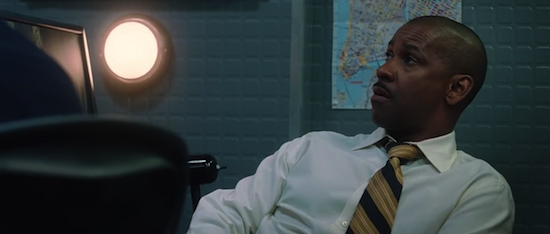
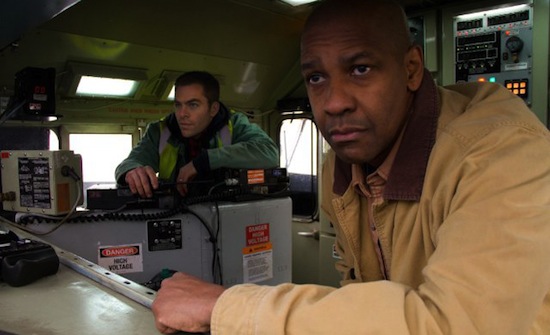

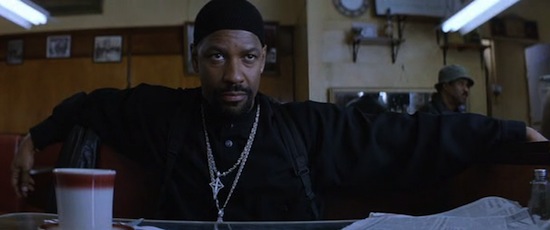

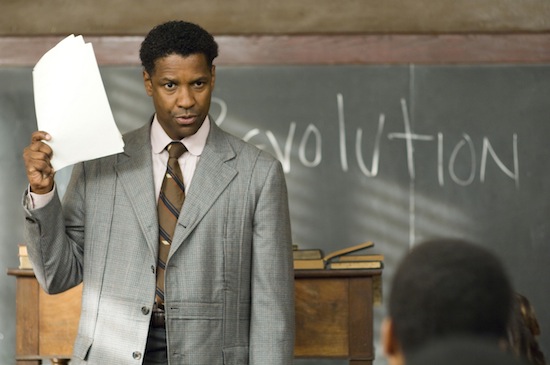

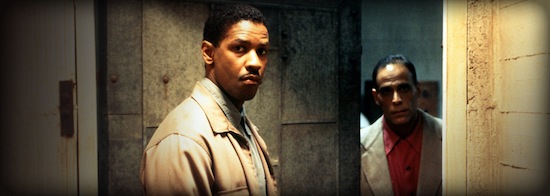
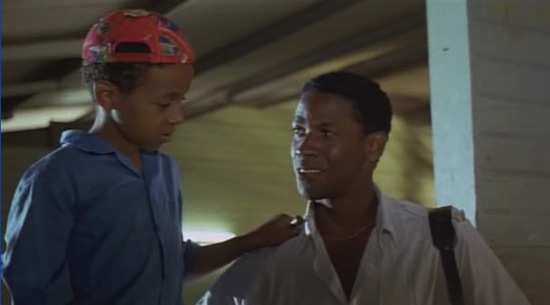
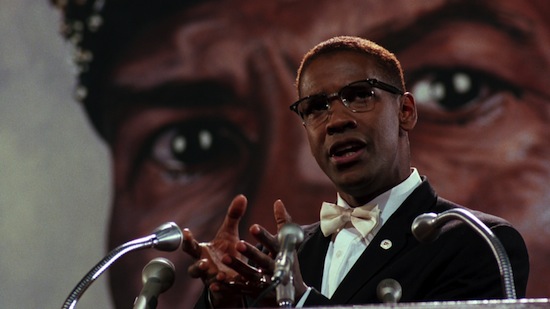
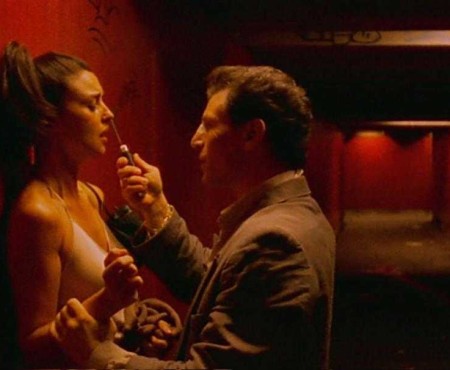
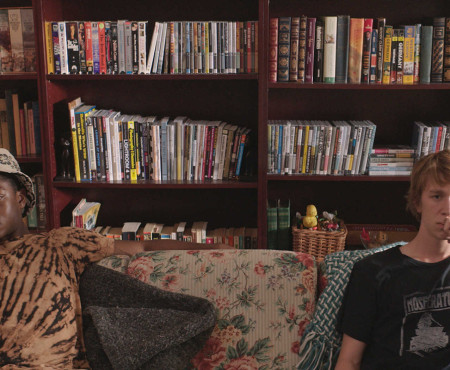
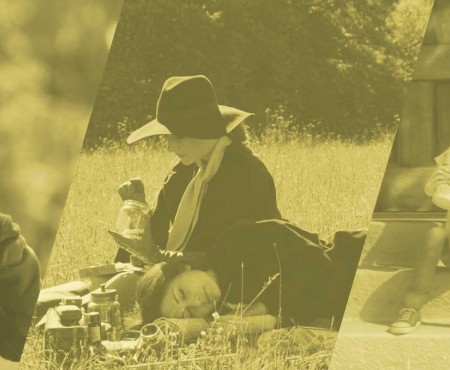
4 thoughts on “10 Denzel Washington Performances”
I know it was a recent movie and it got a lot of backlash from a few critics, but I thought Washington gave one of his best performances in Flight, giving what could’ve been a one-note character a surplus in depth and personality. I still agree that Malcolm X is his greatest work and the one he will and should be remembered most for, but I felt that Flight would’ve been a pretty worthy addition to this list. Granted, I know this isn’t a “Top 10 List” per se, but still.
I originally mentioned Flight, pointing out that it was the moment Denzel stopped caring about his persona. As suspect as the movie is, Washington’s performance is excellent. I shouldn’t have edited that out.
I agree with the top pick and think it’s one of the great performances in any film. I also agree that Training Day is in the right spot; it’s a good role but gets a little shaky near the end. I also didn’t mind his work in American Gangster. It was a little disappointing because of huge expectations, but he brings weight to a role that could have gone too soft given his persona. It worked better for me than The Hurricane.
I think his role in “Philadelphia” was good too and could get some consideration. Truly, though, he could have a top 20 list. He’s easily the best actor of his generation, consistently giving strong performance for the past 4 decades now, which is unreal. Maybe Jack Nicholson had a longer run…